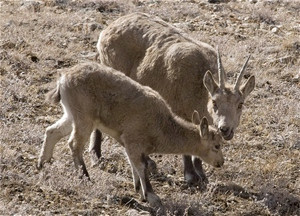Home » Reports & Data » Progress » Transforming Lives » Victory for Endangered Species in Afghanistan

The ibex is now one of Afghanistan’s protected species.
Wildlife Conservation Society
USAID gains legal protection for 33 rare and endangered species in Afghanistan.
30 NOVEMBER 2009 | KABUL, AFGHANISTAN
Afghanistan is home to a wide mix of wildlife unlike any in the world. Some animals, such as the snow leopard and Marco Polo sheep, are found in very few other countries. Protecting these and other endangered species is essential to preserving the Afghanistan’s unique biodiversity.
When a presidential decree banning certain types of hunting in Afghanistan expired in March 2009, many rare and endangered local species were suddenly at great risk. Fortunately, USAID and its partner the Wildlife Conservation Society (WCS) were ready to respond.
USAID and WCS worked with the Afghanistan National Environmental Protection Agency (NEPA) to develop lists of protected and harvestable species in the country. In late May 2009, NEPA published the first protected species list, putting 33 rare and endangered birds, plants, insects, amphibians, and mammals under legal protection.
The list, which includes the snow leopard, the Marco Polo sheep, the Siberian crane, and the Paghman salamander, is being expanded through a unique collaboration between USAID, Kabul University, and the University of Richmond in Virginia. Students majoring in environmental studies assess proposed species, make recommendations, and then participate in joint electronic discussion sessions with the Afghan Wildlife Executive Committee (AWEC) – the official body established to create species lists.
Conservation is still a new topic for most government officials and academic professionals in Afghanistan. USAID worked with NEPA to facilitate the creation of AWEC and continues to provide the committee with technical assistance and training.
By the end of the review process in 2009, approximately 70 species will be on the final protected list. USAID is also working with Afghan authorities and local communities to create the infrastructure (including a trained and equipped ranger corps) to enforce environmental regulations, further ensuring the protection of Afghanistan’s rare wildlife.







Comment
Make a general inquiry or suggest an improvement.